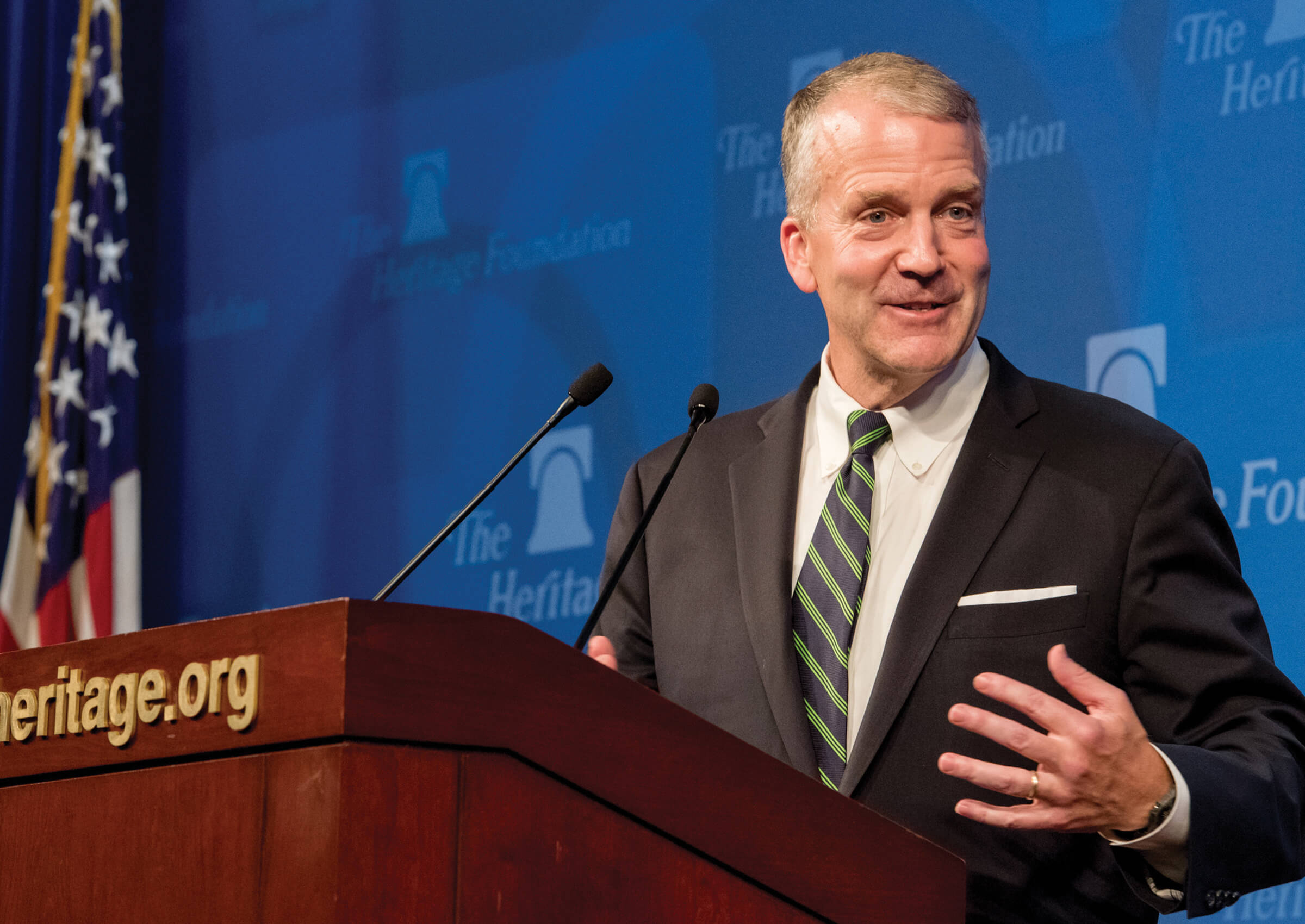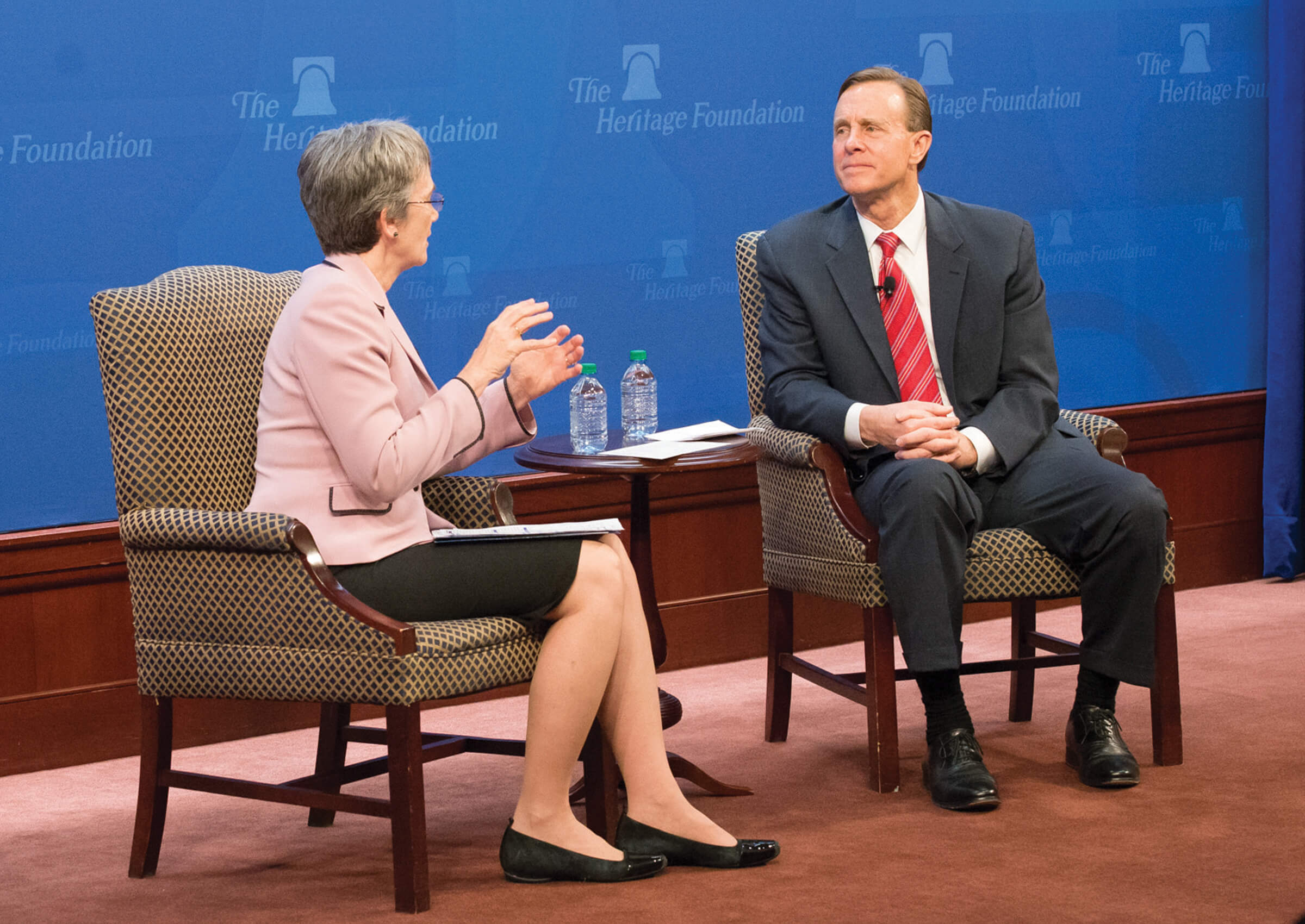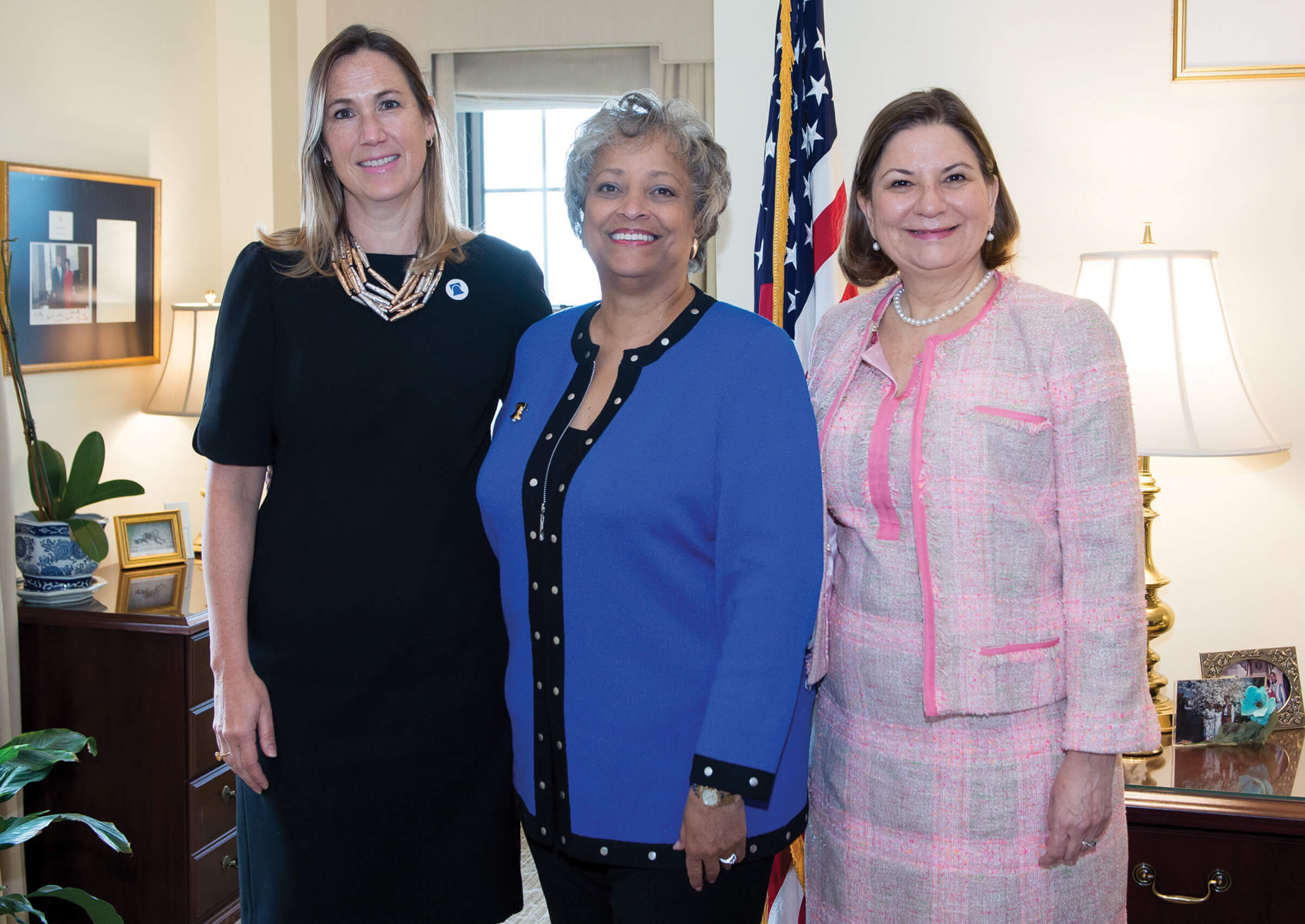2019 Annual Report
Principled Leadership in a Challenging World
Davis Institute for National Security and Foreign Policy
Ana Quintana
Senior Policy Analyst for Latin American Affairs
Follow: Twitter
A first-generation American of Cuban descent, Ana Quintana was raised with a keen appreciation of freedom and democracy.
Armed with a bachelor’s degree in political science and a master’s in global security studies, she landed her first “real job” at the Defense Department, honing her skills as an analyst of Latin American affairs.
Her desire to shift from pure analysis to policy development led her to Heritage in 2013. “I wanted a place that shared my values and that went beyond just trying to explain problems to actively advancing policies that will fix the problems.” Our Allison Center for Foreign Policy proved to be the perfect match for Quintana—and 2019 was her most eventful year yet.
As our senior policy analyst for Latin American affairs, she continued working to unspool the former administration’s dalliance with Havana—what Quintana calls “Obama’s bid to normalize relations with an abnormal regime.” She also campaigned tirelessly to increase international pressure on Nicolas Maduro’s brutal and illegal regime in Venezuela, even travelling as far as Berlin to address the German Foreign Ministry’s first-ever Latin America Conference.
Back in D.C., she hosted a series of meetings for El Salvador’s President-elect Nayib Bukele. His first public speech in the U.S. drew a standing-room-only crowd to our Allison Auditorium.
“The crowd was amazing and so was its diversity,” Quintana recalls. “Elected officials, diplomats, business executives, members of the Salvadoran diaspora from as far away as Massachusetts—even construction workers from a couple of floors below—all came to hear this incredible man, a successful third-party candidate determined to unite a country still reeling from decades of civil war.”
Yet, it was U.S.-Mexico relations that received most of Quintana’s attention in 2019. The year began with a new, leftist president taking office, a “new NAFTA” trade deal in doubt, predatory criminal cartels wreaking havoc, and an increasingly porous border. Quintana faced no shortage of challenges. But she didn’t have to face them alone.
“One of the best things about working at Heritage—one of our greatest strengths—is that whenever you’re dealing with something really important, every department treats it as important, too,” she notes.
“So, on something like immigration reform, it’s not just me or just the Davis Institute working on it. It’s our Legal Center; it’s the Roe Institute; it’s Domestic Policy; it’s Policy Promotion and Communications and Government Relations. The whole atmosphere is extremely collegial, supportive, and energizing,” she adds.
It’s also extremely effective.

The Asian Studies Center hosted a historic video conference featuring the president of Taiwan, in addition to private events that included an annual U.S.–Republic of Korea Dialogue.

At the President’s Club Meeting, current and former homeland security officials Ken Cuccinelli, Mark Morgan, and Tom Homan thanked Heritage for our guidance and support in closing loopholes in the dysfunctional immigration system.
Winning the Battle at the Border
In late 2018 and early 2019, massive “caravans” of immigrants turned our long-standing border crisis into a full-blown emergency.
Heritage responded with a special report: “An Agenda for American Immigration Reform.” A humane blueprint for fixing our broken immigration system in a way that keeps America free, safe, and prosperous, it was welcomed by the administration.
Within months, the White House was putting our recommendations into practice. For example, it started enforcing the long-ignored “public charge” provision, which can deny admission to the U.S. of those likely to rely on public benefits.
It also replaced the Obama-era “catch and release” policy with a “remain in Mexico” policy. Now, instead of being released into the U.S. while awaiting an asylum hearing, captured illegal immigrants are sent back across the border to await their day in court.
This basic reform had a profound impact. By year’s end, border apprehensions had plummeted 78% from May levels. The number of families caught crossing illegally plunged from 84,486 to just 9,000. As the El Paso Times put it, “The policy has proved to be a virtual wall.”
Also in keeping with our recommendations, the administration began denying asylum to those who had crossed another country without seeking asylum there first. And it struck deals with Central American countries that let the U.S. return asylum seekers to El Salvador, Guatemala, and Honduras.
To make sure these reforms “stuck,” the White House pressured our southern neighbors with loss of aid if they continued to ignore their obligations regarding border security and providing asylum. These Heritage-backed policies effectively put an end to the migrant caravans.
Heritage’s solutions promise to influence future debates, as well. Our ideas inspired the administration to develop two legislative proposals—one dealing with legal immigration reform, the other on border enforcement—which it plans to introduce in 2020. Heritage experts advised on the drafting of both measures.

Kiron Skinner, a former senior advisor to Secretary of State Mike Pompeo, joined Heritage as a visiting fellow in September and makes frequent appearances on Fox News.

Sen. Dan Sullivan, R–Alaska, delivered the annual B.C. Lee Lecture. This year’s topic: “America’s Indo-Pacific Policy: Prospects During a Critical Time of Change.”
Rebuilding Our Military the Right Way
For years, Washington has asked our fighting men and women to do more with less. The result: a shrinking, aging military.
Since 2015, Heritage’s Center for National Defense has published an annual Index of U.S. Military Strength analyzing how our armed forces stack up against the threats they face now and in the foreseeable future. Our latest report found the relative strength of each service branch ranged from marginal at best to weak at worst.
The unflinching assessment garnered significant media attention from outlets such as Bloomberg, The Hill, Politico, and C-SPAN, delivering a loud wake-up call about the need to rebuild our forces.
Rebuilding requires adequate funding, of course. And that’s largely contingent on what the annual National Defense Authorization Act (NDAA) says.
For months, it looked like Congress might not even be able to pass an NDAA for FY 2020. That’s when Defense Budgeting Analyst Frederico Bartels published “Building an NDAA That Strengthens America’s Military,” a report offering guidance on how to refine the proposals then pending before the House and Senate.
Finally, in December, lawmakers passed the authorization. Heritage’s influence was evident throughout. The final bill adopted, in whole or in part, 39 of Heritage’s 57 recommendations. It was, Bartels said, “a good step forward in rebuilding our military.”
But in what way should the military be rebuilt? And for what purpose?
To answer both questions, our Center for National Defense launched its Rebuild America’s Military Project (RAMP), a series of reports analyzing what each military branch will need to fulfill its mission into the foreseeable future.
The first report, analyzing the Marine Corps, recommended returning the corps to its original purpose as a sea-to-land force—a critical shift largely driven by China’s rising threat in the Indo-Pacific. That report was read closely by Gen. David Berger, who became the U.S. Marine Corps’ 38th commandant in July. Shortly after taking his new command, Berger issued a planning guidance document that echoed every major point made in our report.
The second RAMP report, released in August, focused on the Army. Written by Director Thomas W. Spoehr, a retired lieutenant general, the report stressed the need to concentrate on solving the Army’s own unique operational and tactical problems rather than trying to match our adversaries’ military capabilities. It also urged planners to remain flexible and eschew “groupthink.”
Center experts briefed Army Chief of Staff Gen. James C. McConville on the report, and, thanks to its influence, the Army now intends to revamp its modernization efforts.
Both reports gained significant attention among mainstream media as well as defense publications such as Marine Corps Times, Military.com, Task and Purpose, and RealClearDefense. We will release RAMP reports on the Navy and Air Force in 2020.
CITE Hits the Road

Executive Vice President Kim Holmes at the American launch of the 2019 Index of Economic Freedom.
Our Center for International Trade and Economics launched the silver anniversary edition of the Index of Economic Freedom with a public event featuring presentations by Heritage President Kay C. James, Executive Vice President Kim Holmes, and CITE Director Terry Miller. But that was just the first in what was a global rollout of the publication.
Exiting Bad Treaties and Brexit-ing for Good
In May, President Donald Trump announced the U.S. would be “unsigning” the Arms Trade Treaty. It was a major win for Heritage.
The feel-good treaty was supposed to regulate transnational sales of everything from small arms to battle tanks and warships. In practice, the Obama-era pact was ignored by the bad guys—just as Heritage had predicted from Day One.
For Ted Bromund, a senior research fellow in our Margaret Thatcher Center for Freedom, the administration’s decision marked the successful conclusion of a nearly decade-long campaign. Bromund first entered the fray in August 2009 with a research paper decrying the not-yet-finalized treaty as “a dangerous multilateral mistake in the making.”
In the following years, he published more than 200 additional reports, op-eds, scholarly articles, and lectures—all exposing the flaws and dangers of the treaty. Time after time, he carried his message into the very belly of the transnational beast, attending the Arms Trade Treaty conferences in 2012, 2013, 2015, and 2018 and even making two addresses at the United Nations.
While the international set remained unmoved, Bromund found a far more interested audience in the Trump administration. The White House statement announcing U.S. plans to withdraw from the treaty echoed the arguments Bromund had advanced for years.
Brexit was another welcome development that had been a long time coming. Lady Margaret Thatcher was the first British politician to call for the U.K. to extricate itself from the European Union. Fittingly, Heritage’s Thatcher Center has been the leading voice in the U.S. urging withdrawal.
Britain’s parliamentary elections in December finally sealed the deal. By year’s end, the U.K. was set to leave the European Union in early 2020 and become a truly free, sovereign nation once again.
So what’s next for Britain? Heritage has reason to hope it will be a large-scale free trade agreement between the world’s largest and fifth-largest economies.
The Thatcher Center was the first think tank on either side of the Atlantic to propose this free trade deal—broaching the idea in a 2014 report. Both countries are now working to get it done.
In August, we hosted Britain’s international trade secretary, Liz Truss, who gave a major speech on advancing a deal. The following month, we hosted former U.K. Trade Secretary Liam Fox for a roundtable discussion of next steps. A pact may well be signed in 2020.
Throughout the year, the Thatcher Center kept a productive dialogue going with other allies and partners on a variety of topics. For example, senior officials from Denmark, Italy, and Sweden—as well as the U.K.—called on Margaret Thatcher Fellow Robin Simcox for advice on developing effective transatlantic counterterrorism initiatives.
Senior Research Fellow Brett Schaefer was chosen as one of 18 experts to represent the U.S. at the U.N. Committee on Contributions in New York. He later hosted the U.N. High Commissioner for Human Rights Michelle Bachelet. Back in D.C., Schaefer briefed the National Security Council on reforms needed in U.N. administration and in its peacekeeping operations.

Senior Research Fellow JV Venable hosts a conversation about military modernization with Secretary of the Air Force Barbara M. Barrett.

Kay C. James and Kim Holmes welcome Estonian President Kersti Kaljulaid and Jonatan Vseviov, the ambassador of Estonia to the U.S., prior to a roundtable discussion hosted by our Thatcher Center.
Making Trade Treaties Better
Trade with our North American neighbors accounts for a massive part of the U.S. economy. The North American Free Trade Agreement (NAFTA), which was passed in 1994, created one of the largest free-trade zones in the world, allowing America to export more products and services, create more jobs, and grow the economy.
As beneficial as NAFTA was, the modern economic landscape is far different from what it was 25 years ago. The digital trade of goods and services, and the need to protect intellectual property, has increased dramatically in recent years—issues NAFTA did not address. Renegotiating a trade deal with our neighbors that reflects the reality we live in was a common-sense decision.
Since the renegotiation process began in May 2017, trade experts in our Davis Institute and our Institute for Economic Freedom have provided nonstop guidance and recommendations to the administration on how to make the trade deal, dubbed the United States–Mexico–Canada Agreement (USMCA), the best it can be. We advocated tirelessly for a deal that protects free and open trade—and we weren’t afraid to disagree with the administration when it leaned toward protectionist policies.
Despite our occasional differences, our work has earned us respect and appreciation from the administration. In fact, Vice President Mike Pence chose to give a speech on the USMCA at Heritage headquarters in September.
In the end, the negotiations produced a USMCA that will strengthen protections for intellectual property rights and open up new markets, while continuing NAFTA’s tariff-free treatment of many goods and services.
Then, when members of Congress delayed on adopting USMCA, Heritage President Kay C. James and other Heritage staff issued public reports and statements urging them to act. Finally, in December, the House voted overwhelmingly to approve the USMCA.

In September, U.S. Vice President Mike Pence gave an address at Heritage to kick off the administration’s final push to gain congressional approval of the landmark USMCA trade pact.

Heritage President Kay C. James (right) welcomed the Mexican and Canadian ambassadors to a special reception. Four months later, she would participate in the bill-signing ceremony at the White House.
Hedging on China
Our Index of U.S. Military Strength rates China as the single greatest threat facing the United States. Beijing is pouring vast resources into the most modern forms of combat power and technology with the express aim of challenging U.S. military dominance in the Indo-Pacific.
Thanks to the work of our Asian Studies Center, four democratic nations in the region are standing up for peace and order in the Indo-Pacific. Since 2013, national security analysts from Heritage and leading think tanks in Australia, India, and Japan (as well as a fifth or “plus” country, chosen every year) have gathered annually to share their insights and strategies at the “Quad-Plus Dialogues.”
In 2019, the ties between these countries grew even stronger. In September, secretaries of state from the Quad countries met for the first time—something Heritage has urged for years. Senior government officials met again in November to discuss joint efforts to promote stability, economic prosperity, and the rule of law in the Indo-Pacific. They will reconvene in the spring of 2020.
This is a key diplomatic initiative for Heritage. It has become such an important tool for countering Chinese aggression that Secretary of State Mike Pompeo publicly praised it as ensuring that China “retains only its proper place in the world.”
In August, the State Department followed another Heritage recommendation, formally announcing that the U.S. had withdrawn from the 1987 Intermediate-Range Nuclear Forces Treaty. The pact limited U.S. missile deployments but not China’s. This move puts us on a more even strategic footing with China. Addressing China’s rise remains a top policy priority for 2020.
Two More Wins for the Allison Center

Secretary of State Mike Pompeo lauds the diplomatic progress made by Heritage’s “Quad-Plus Dialogues.” in an Oct. 22 speech.
In the spring, Jim Phillips and the Hudson Institute’s Nina Shea met with Brian Hook, the U.S. special representative for Iran and senior policy advisor to Secretary of State Mike Pompeo. They pled the case for providing direct aid for displaced Iraqi Christians and Yazidis still threatened by Islamist militias. Their research convinced Hook to press forward, and by year’s end USAID began awarding grants to religious charities providing relief services to these persecuted groups.